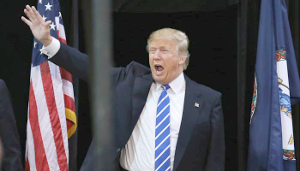President-elect Donald Trump has named a handful of picks for top positions in his incoming cabinet, tapping former Lt. Gen. Michael Flynn for the position of National Security Adviser, Sen. Jeff Sessions (R – AL) to Attorney General, and perhaps most controversially of all, Rep. Mike Pompeo (R – KS) to director of the CIA.
 Flynn was a former director of the Defense Intelligence Agency (DIA), who in 2014 claimed he was forced into retirement for questioning President Obama’s narrative on the war on terror. Flynn has subsequently run a lobbying firm which was believed to be lobbying on behalf of Turkey’s government.
Flynn was a former director of the Defense Intelligence Agency (DIA), who in 2014 claimed he was forced into retirement for questioning President Obama’s narrative on the war on terror. Flynn has subsequently run a lobbying firm which was believed to be lobbying on behalf of Turkey’s government.
Flynn backed Trump throughout the campaign, and supported his position on NATO, saying that the US can and should insist on reciprocity from other member nations as a condition for military support.
Flynn’s position on US-Russia relations is somewhat less certain, as he’s been labeled “Russia-loving” by critics, but also has written that Russia is part of a major “global axis” of nations and forces arrayed against American interests. In appearances on RT, he has called for the US and Russia to “work together,” but a lot of the allegations of him being in league with Russia are likely focused on him agreeing with Trump on NATO, as NATO is loudly opposing any US rapprochement with Russia.
Rep. Pompeo is seen as likely to be an even more contentious pick, heading from the House Intelligence Committee into the CIA. Pompeo is an outspoken advocate of NSA surveillance, who has called for the execution of whistleblower Edward Snowden for making the surveillance known to the American public. He has also called for ending the P5+1 nuclear deal with Iran, saying after the election that he “looked forward” to destroying the deal.
Pompeo’s position on Syria is likely to loom large in his appointment, as he is said to be in favor of ending the CIA’s arming of Syrian rebels, but was also an eager supporter of a direct US military attack on Syria‘s government in 2013. Trump is planning to end the rebel arming scheme, but doesn’t appear to want to impose regime change in Syria either, instead talking up focusing the fight on ISIS.
Pompeo generated further controversy in 2013 by claiming that leaders of America’s Muslim minority are all “potentially complicit” in terrorist attacks because they don’t spend enough time publicly condemning those attacks. He followed this up with demands that all American Muslims “refute terrorist theology.”
Pompeo is seen as being put in charge of the Trump Administration’s effort to roll back reforms made at the CIA in recent years. The reforms include a number of moves made in response to the 9/11 report’s statements on the intelligence gaps.
Sessions is also seen as eager to make major changes at the Justice Department as the new Attorney General, with cracking down on immigrants likely to be a major focus for him. Sessions is also seen as a right-wing hardliner who identifies with his former position as a prosecutor and will be eager to aggressively enforce laws.
Sessions’ nomination has been criticized by many, including the NAACP, who Sessions previously condemned as an un-American group teaching anti-American values. Sessions was also accused of calling both the NAACP and the ACLU “Communist-inspired” groups.
Flynn was always expected to get a significant role like the National Security Advisers, while Sessions had previously been mentioned as a possible Defense Secretary before being put in the Justice Department. Pompeo is the most surprising of the three appointments, as he had not been widely reported to be in the running for anything.


